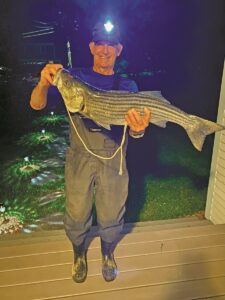Catching a fish at night off the beach is as easy as turning off a light. Only in striper fishing, that light is actually the Moon.
I’m surprised how few fishermen take advantage of the opportunities the darkness brings. For three or four nights in a row last week, the fishing off Ballston was absolutely spectacular.
On the last night of the run, the stripers arrived at dusk chasing menhaden. The fishing got better and better the darker the night became. But when the moon made its appearance from behind a bank of clouds, it was as if a switch had been thrown. The fish stopped biting.
What you need to fish at night is only a reliable rod and reel, waders, a few good lures, and a rope around your waist to drag a nice fish down the beach if you’re a long way from the parking lot. Oh, and a headlamp.

The hardest part of night fishing is planning for the ideal combination of Moon phase, tides, and weather. Ideally, I like a new Moon or not-yet-risen Moon, a lower tide (I like mid and falling tides), and southwest or light winds. The Moon and tide can be easily planned for in advance but not the weather, of course.
Stripers come in to the beach at night because the darkness offers them an immense competitive advantage over the baitfish they chase, which on any given night might be sand eels, menhaden of various sizes, shad, tinker mackerel, or even squid. Stripers are bigger and have superb eyesight. But they’re not necessarily as fast as their quarry. That’s where low tide comes into play, when the sandbars and fast-moving currents next to shore allow them to trap their prey.
It’s not unusual to find huge stripers in less than two feet of water, sometimes beneath the oncoming white water. Most recently, the stripers were chasing six-inch menhaden right into the wash, grabbing confused, almost-stranded bunker as they washed up in the shore break and then swimming back into deeper water with the retreating wash.
I love night fishing not just because of the often fierce action. Fishing at night is like traveling to another country, or even an alternate universe. I like heading away from other fishermen not for any other reason than being alone in a nearly unrecognizable place, surrounded on one side by barely distinguishable cliffs and dunes and on the other by waves that I can hear breaking but can’t see until they reach the shore.
A headlamp, like the Moon, will drive the fish away. I turn mine on when I’m changing gear, taking a hook out of a fish’s mouth, or beaching a particularly large fish and need to time the arriving wave. The rest of the time, the dark feels like my own, perfectly wild, perfectly magical world.
No matter how hot the day has been, the night air becomes damp as it cools, generating a fine mist which, illuminated by a headlamp, fills the air like a swarm of fireflies. Some fishermen use red lamps to better preserve their night vision. It’s available on most headsets, but even that feels to me like too much of an intrusion.
The darkness seems to exaggerate every adventure. On the last night of the run, I was fighting a nice striper when I heard a loud splash. It was followed by an enormous tug. When the line began peeling off my reel, I knew I had unintentionally hooked a seal. I tore down the beach after it, winding frantically to take back as much line as possible before breaking off the seal.
I ran in the inky darkness until the angle of the line told me I had retrieved most of it. Pointing the rod to where I imagined the seal to be and pressing the line hard against the grip, I backed up until the line broke. I hoped the seal would easily shake the barbless hook out of its mouth as it departed. Then I began the long walk back, in the dark, to resume my fishing.



